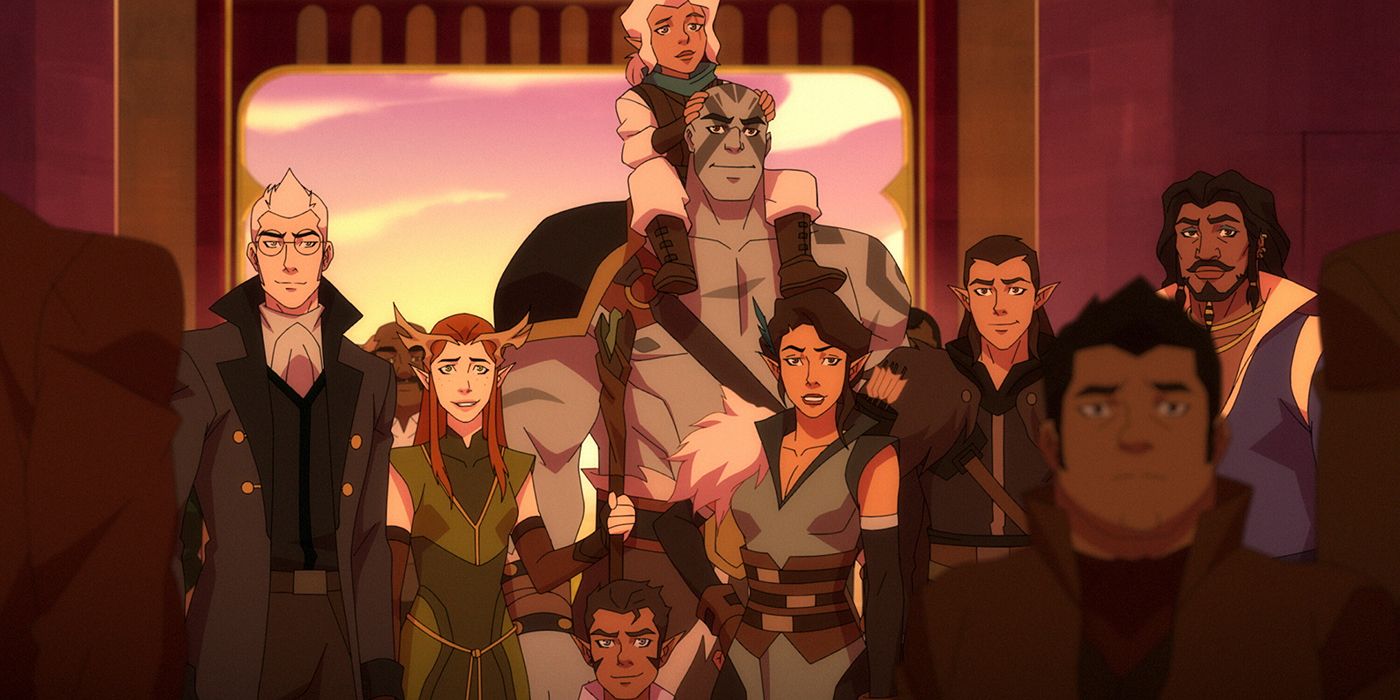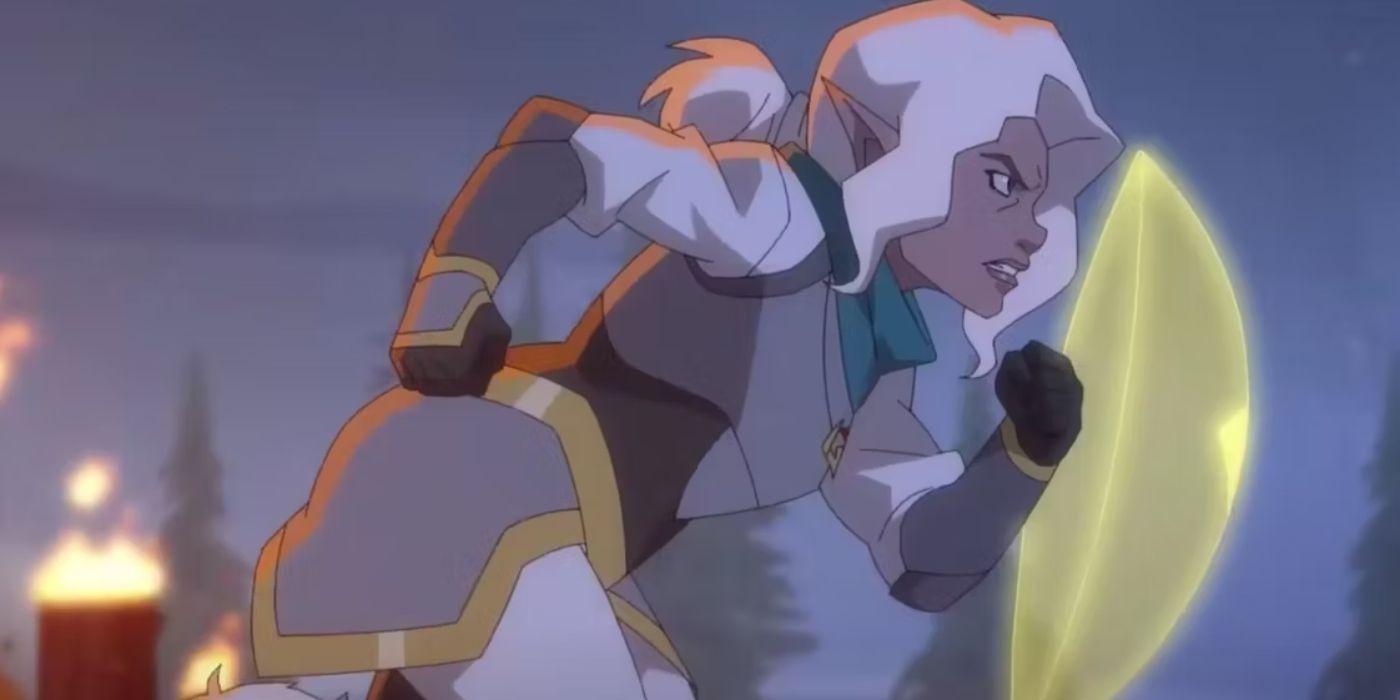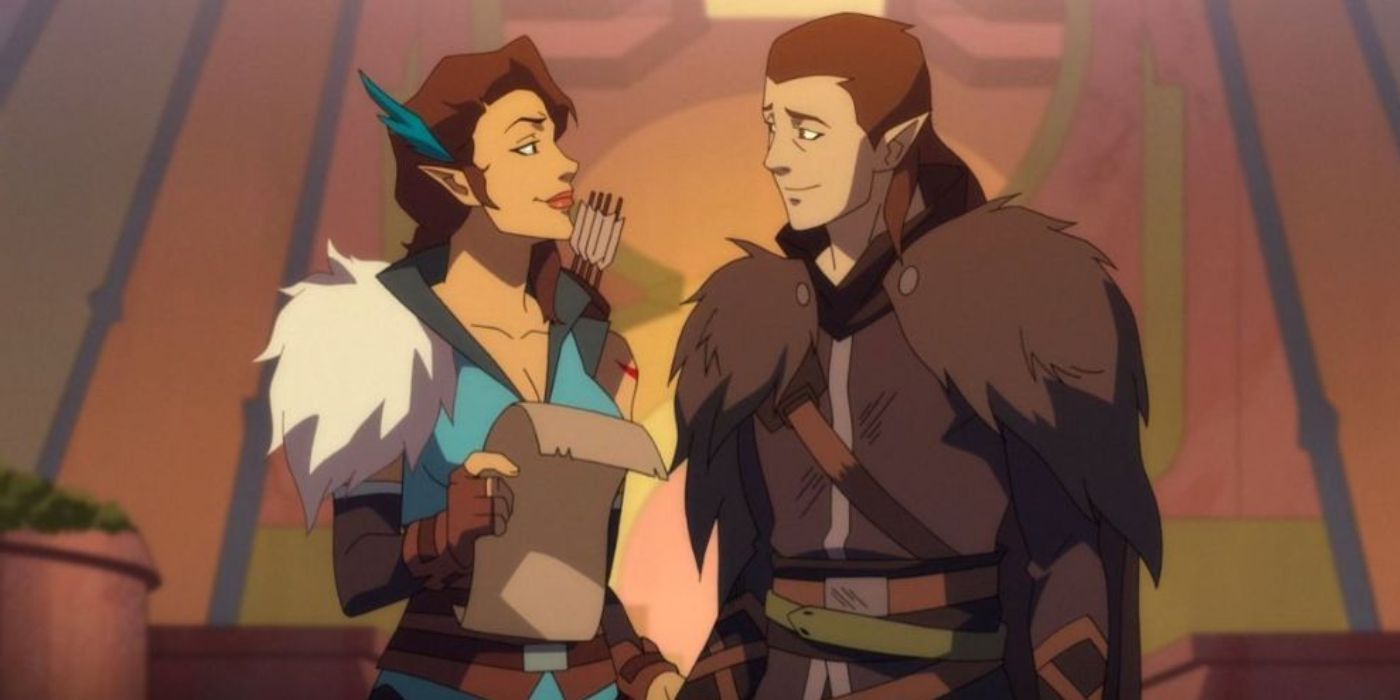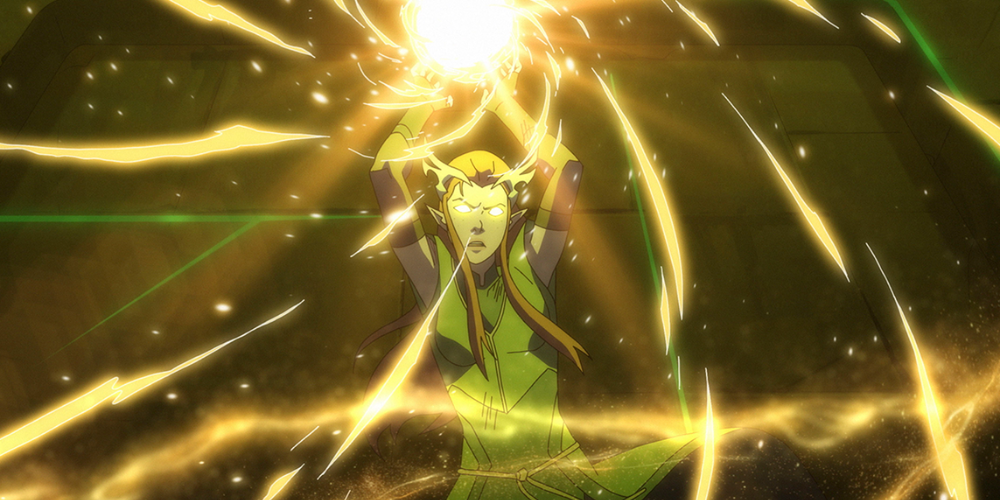Editor’s Note: The following contains spoilers for The Legend of Vox Machina podcast show.
The Big Picture
- The Legend of Vox Machina condenses the original D&D campaign into a scripted format that captures the creative magic of the original series.
- The gods play a significant role in the final arc of Campaign One, with Vox Machina becoming champions of different gods and receiving blessings.
- The arc showcases character development and highlights the growth and strengths of the individual Vox Machina members, especially Pike, Scanlan, and Vex.
Based on a live-streamed Dungeons & Dragons game, The Legend of Vox Machina is a different beast than most adaptations — and yet, it’s also not. The source material, Critical Role, was improvised in front of thousands instead of pre-planned in a writer’s room, but the talent of the eight experienced voice actors involved, as well as their passionate commitment to quality storytelling, resulted in a sprawling epic with discernible plot arcs and character development. The Legend of Vox Machina condenses thousands of hours of dice-rolling into a scripted format that replicates the original series’ innately creative magic with the benefit of hindsight. Charmingly raw gameplay is tweaked into organic cohesion, the series’ flow representative of traditional scripted content. Those who watched the original D&D campaign know how things end, so the magic this time lies in seeing what changes and what stays the same. Every arc has something unique to offer, including the mini-arcs grouped underneath a larger plot umbrella. And if the Critical Role company loves me at all, they’ll apply the “waste none want none” principle to the best of those mini-arcs: that time Vox Machina became Champions of the Gods. Quite an upgrade for the realm’s biggest jerks, huh?
How Do the Gods Work in ‘The Legend of Vox Machina’?
The final arc of Campaign One sees Vox Machina face their fiercest foe: Vecna, the undead lich with aspirations of godhood. If you’re a fan of the Stranger Things persuasion, the name “Vecna” probably caused a double-take. Yes, Vox Machina battles the same skeletal creeper, just interpreted through Matthew Mercer‘s fantasy world. Because of copyrights, it’s very likely The Legend of Vox Machina will change their final antagonist’s name to something original but keep the premise. For this piece, “Future unnamed skeletal creeper” will still be called Vecna.
Like all proper big bads, Critical Role‘s Vecna, a mortal mage, craves phenomenal cosmic power and to reshape the world to his liking with said power. In Exandria, the best path to ultimate power is by becoming a god. It’s not the quickest or the easiest way, but it’s possible. There’s one important rule about the gods of Exandria, however: they operate at a remove from the mortal people they created. Centuries before the events of Vox Machina, thousands of Exandrians perished in a war called the Calamity waged between the gods and the Primordials, the elemental beings who originally populated Exandria. The Primordials didn’t like mortals invading their space. The good gods (the Prime Deities) protected their mortal creations, while the gods who favored chaos (the Betrayer Gods) sided with the Primordials. After defeating the Primordials and the Betrayers, the Prime Deities created the Divine Gate, a barrier that keeps all divine entities separate from the mortal realm. Holding themselves partially responsible for the Calamity, the Prime Deities also retreated from reach. They can guide mortals and gift them with certain magical abilities, but they can’t directly intervene.
So when Vecna decides to make himself everyone’s problem, Vox Machina are the only heroes brave enough (and/or foolish enough) to take him on. They beseech the gods for help because there’s some established wiggle room: the gods can make certain mortals their “champion,” blessing them with extra strength. As they prep to do battle with Vecna, several Vox Machina members receive these blessings. More than just conveying how severe a threat Vecna poses, this mini-arc is the crowning moment for several characters. Vox Machina doesn’t need divine approval to save the world, but it’s still a worthy recognition that’s long overdue: a personalized celebration of these characters’ strengths and uniqueness (be that determination, intelligence, love, etc.) and how far they’ve grown since the selfish mercenaries of the pilot episode.
As a devout cleric of the Everlight, the goddess of healing, Pike Trickfoot (Ashley Johnson) is the first to receive an ethereal boon. The Everlight is as much about emotional atonement as physical healing, and in the original campaign, Pike spent much of her time away from the group rebuilding one of the Everlight’s ruined temples. She wasn’t always such a compassionate gnome, but she committed herself to helping others in her goddess’ name.
In The Legend of Vox Machina Season 1, Pike’s already encountered the Everlight face-to-face. The encounter kickstarted Pike’s self-actualization, so there’s no better culmination to her arc than becoming the Everlight’s champion in title as well as heart. Pike is a guiding light for countless people and for the Everlight; Pike’s steadfast belief helped restore the goddess’ waning powers. Sure, the blazing phoenix wings Pike receives are badass, but it’s the image of this massive, room-filling god standing before a tiny gnome and recognizing Pike’s selflessness that makes this moment profound. It’s The Lord of the Rings sentiment that “even the smallest person can change the course of the future” applied to an even smaller creature with an even bigger heart.
Why Do the Gods Choose Vex and Scanlan?
Awed by the Everlight’s benevolence, the previously insular and isolated Vex’ahlia Vessar (Laura Bailey) discovers faith for the first time via Pelor, the Dawnfather, the god of the sun. At first, Vex hesitates; her flirtatious charm conceals the tender heart of a desperately lonely figure aching for affection after a life of rejection. Pelor’s a prickly and haughty god, but between Vex’s burgeoning belief and her connection to Whitestone (Pelor created the Sun Tree that guards the city), he grants Vex one chance to prove herself. The quest is a literal race against time, during which Scanlan Shorthalt (Sam Riegel) casts the most symbolic spell of all time: he temporarily changes Vex into a red dragon, the creature she devoted her life to hunting after one slaughtered her mother. Once Vex completes her task, Pelor demands the rest of Vox Machina testify to her adequacy.
As a viewer, Vex’s friends eloquently declaring their love for her is one of those “why am I suddenly weeping?” moments. It’s also where I’m obligated to remind you that the cast improvised their dialogue. Scanlan points out Vex is far from perfect, but “she’s the most perfect of all of us,” while Vex’s twin brother Vax’ildan (Liam O’Brien) calls her “every hope I have” and “me, but better.” A smiling Pelor surrounds Vex with light and declares her his champion. The man who literally guards the sun’s path and who’s arguably Exandria’s ultimate father chooses Vex, the lonely woman who longed for acceptance, family, and love.
Scanlan, meanwhile, stumbles into a higher calling with Ioun, the goddess of knowledge. At first glance, few would classify Scanlan as someone likely to win a god’s recognition, especially one who specializes in wisdom. That’s by design. Much like Vex, the person he butted heads with most, Scanlan hides a wounded soul behind bluster, bravado, wit, and sex jokes. When he’s courageous enough to open up to his friends, he receives little except dismissal in return. Season 2 of Vox Machina has already laid the breadcrumbs for a reckoning between Scanlan and the group, one that results in his friends listening to him, supporting him, and trusting him after he spent years feeling ignored. Scanlan proves himself to be Exandria’s most resilient gnome as well as a learner and a teacher. A god choosing Scanlan as their champion is the ultimate stamp of loving acceptance. Scanlan doesn’t volunteer; Ioun knows he’s the one. “You are a storyteller,” she tells him, “and I am the keeper of all stories.” In a perfect bit of unplanned symmetry, it’s even Vex whose help proves crucial to Scanlan’s success. When it matters most, the divisive pair help one another soar.
The Gods Arc Highlights ‘Vox Machina’ at Its Best
Since Vecna’s evil plots put Vox Machina on a tight timeline, the group only visits the Everlight, Pelor, and Ioun. This is an opportunity for the creative team to flex their narrative hindsight through some pointed changes. Vax is already set as the Raven Queen’s Champion, but there are plenty of gods to go around. Grog Strongjaw (Travis Willingham) has an existing connection to the lord of war, for one, and the anti-religious Keyleth (Marisha Ray) demonstrates tentative interest in the nature goddess her people revere. Percy de Rolo (Taliesin Jaffe) might be the one outlier given his past, “Oops, I agreed to demonic possession, so I could exact my revenge” situation. But given Percy’s ongoing redemption, there’s hardly a better turnaround than using a god’s power with selfless nobility. Regardless, the Vecna arc is already Vox Machina‘s be-all, end-all tale. It’s massive in scope and humane in heart, that ever-so tricky narrative combination Critical Role does best, and nothing’s more representative of how far these characters have come.
Stay connected with us on social media platform for instant update click here to join our Twitter, & Facebook
We are now on Telegram. Click here to join our channel (@TechiUpdate) and stay updated with the latest Technology headlines.
For all the latest TV News Click Here




